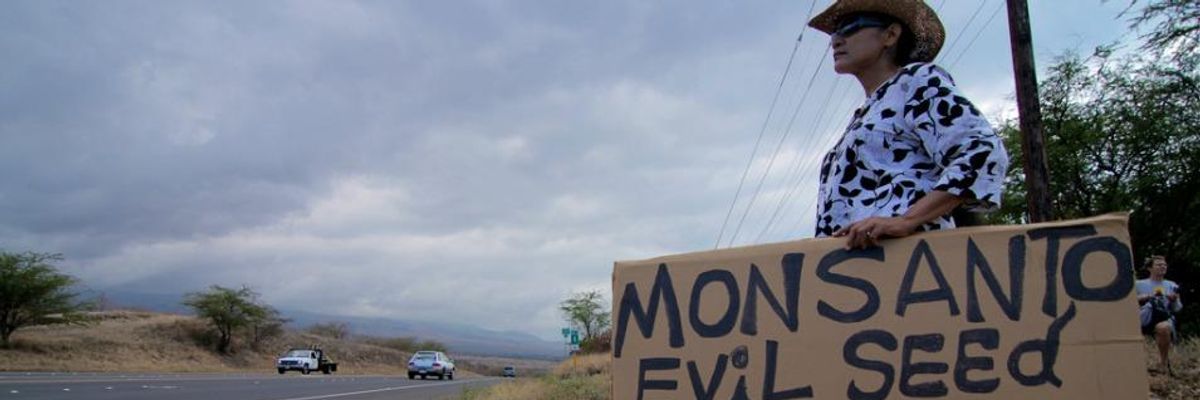

SUBSCRIBE TO OUR FREE NEWSLETTER
Daily news & progressive opinion—funded by the people, not the corporations—delivered straight to your inbox.
5
#000000
#FFFFFF
To donate by check, phone, or other method, see our More Ways to Give page.


Daily news & progressive opinion—funded by the people, not the corporations—delivered straight to your inbox.

Though not unexpected, the suit exposes the threat posed to the agrochemical giants when local people rise up in opposition to the destructive nature of their business model. (Photo credit: Ian MacKenzie/flickr/cc)
Alongside other plaintiffs, two of the world's most powerful agrochemical companies, Monsanto and Dow Chemical, filed suit against Maui County in Hawaii on Thursday, less than two weeks after voters there approved a moratorium on the planting and cultivation of genetically-modified crops within the boundaries of their communities.
"This local referendum interferes with and conflicts with long established state and federal laws that support both the safety and lawful cultivation of GMO plants. For this reason, we believe it is invalid and should never become law," said John P. Purcell, Monsanto of Hawaii's vice president of business and technology.
The legal effort to blog the approved initiative came one day after supporters of the GMO planting ban filed a motion of their own with local courts seeking "transparency and proper implementation" of the moratorium approved by the November 4th referendum victory.
Leading up to the referendum vote, Monsanto and other large agricultural interests dumped millions of dollars into the effort to defeat the local initiative. Given the stakes, it is no surprise that the legal challenges came swiftly.
The official complaint filed by Monsanto and the other plaintiffs against Maui County:
Trump and Musk are on an unconstitutional rampage, aiming for virtually every corner of the federal government. These two right-wing billionaires are targeting nurses, scientists, teachers, daycare providers, judges, veterans, air traffic controllers, and nuclear safety inspectors. No one is safe. The food stamps program, Social Security, Medicare, and Medicaid are next. It’s an unprecedented disaster and a five-alarm fire, but there will be a reckoning. The people did not vote for this. The American people do not want this dystopian hellscape that hides behind claims of “efficiency.” Still, in reality, it is all a giveaway to corporate interests and the libertarian dreams of far-right oligarchs like Musk. Common Dreams is playing a vital role by reporting day and night on this orgy of corruption and greed, as well as what everyday people can do to organize and fight back. As a people-powered nonprofit news outlet, we cover issues the corporate media never will, but we can only continue with our readers’ support. |
Alongside other plaintiffs, two of the world's most powerful agrochemical companies, Monsanto and Dow Chemical, filed suit against Maui County in Hawaii on Thursday, less than two weeks after voters there approved a moratorium on the planting and cultivation of genetically-modified crops within the boundaries of their communities.
"This local referendum interferes with and conflicts with long established state and federal laws that support both the safety and lawful cultivation of GMO plants. For this reason, we believe it is invalid and should never become law," said John P. Purcell, Monsanto of Hawaii's vice president of business and technology.
The legal effort to blog the approved initiative came one day after supporters of the GMO planting ban filed a motion of their own with local courts seeking "transparency and proper implementation" of the moratorium approved by the November 4th referendum victory.
Leading up to the referendum vote, Monsanto and other large agricultural interests dumped millions of dollars into the effort to defeat the local initiative. Given the stakes, it is no surprise that the legal challenges came swiftly.
The official complaint filed by Monsanto and the other plaintiffs against Maui County:
Alongside other plaintiffs, two of the world's most powerful agrochemical companies, Monsanto and Dow Chemical, filed suit against Maui County in Hawaii on Thursday, less than two weeks after voters there approved a moratorium on the planting and cultivation of genetically-modified crops within the boundaries of their communities.
"This local referendum interferes with and conflicts with long established state and federal laws that support both the safety and lawful cultivation of GMO plants. For this reason, we believe it is invalid and should never become law," said John P. Purcell, Monsanto of Hawaii's vice president of business and technology.
The legal effort to blog the approved initiative came one day after supporters of the GMO planting ban filed a motion of their own with local courts seeking "transparency and proper implementation" of the moratorium approved by the November 4th referendum victory.
Leading up to the referendum vote, Monsanto and other large agricultural interests dumped millions of dollars into the effort to defeat the local initiative. Given the stakes, it is no surprise that the legal challenges came swiftly.
The official complaint filed by Monsanto and the other plaintiffs against Maui County: